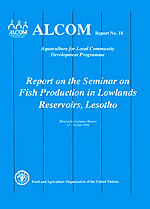 | ALCOM GCP/INT/555/SWE
Aquaculture for Local Community Development Programme GCP/RAF/277/BEL
ALCOM Report No. 18
REPORT ON THE
SEMINAR ON FISH PRODUCTION IN LOWLANDS RESERVOIRS, LESOTHO
13 – 14 June 1994
Maseru Sun Cabanas, Maseru
by
Boyd haight
Senior Agriculturist
FAO/ALCOM
and
Sevaly Sen
Socio-economist
FAO/ALCOM
Funding Agencies:
SWEDESH INTERNATIONAL DEVELOPEMENT AUTHORITY
BELGIAN ADMINISTRATION FOR DEVELOPMENT CO-OPERATION
Executing Agency:
FOOD AND AGRICULTURE ORGANIZATION OF THE UNITED NATIONS
December 1995
|
| The designations employed and the presentation of the material in
this publication do not imply the expression of any opinion
whatsoever on the part of the Food and Agriculture Organization of
the United Nations concerning the legal status of any country,
territory, city or area or of its authorities, or concerning the
delimitation of its frontiers or boundaries. |
The objective of the seminar was to familiarize Government and non-government development
workers with Lesotho's lowlands reservoir fishery resource and potential fish production strategies;
suggest solutions to fish production issues; and identify opportunities to implement these strategies.
The strategies aimed at a sustainable exploitation of fisheries resources. In mid 1992, ALCOM and
the Fisheries Section, Lesotho, revised the sub-project and assigned an ALCOM Staff member to
assist with implementation. The summary of the work done by the ALCOM staff member is
documented in Field Document No 31, Strategies for Fish Production in Lowland Reservoirs,
Lesotho.
ALCOM, the Aquaculture for Local Community Development Programme, is a regional
aquaculture and fisheries programme of the FAO (Food and Agriculture Organization of the
United Nations). Based in Harare, Zimbabwe, it covers all the member-countries of SADC:
Angola, Botswana, Lesotho, Malawi, Mozambique, Namibia, South Africa, Swaziland, Tanzania,
Zambia and Zimbabwe.
ALCOM's aim is to assist member countries improve the living standards of rural populations
through the practice of aquaculture. Toward this end, pilot activities are conducted in selected
member-countries to demonstrate new techniques, technologies or methodologies. Successes
achieved, ideas derived, and lessons learnt are disseminated for use in the region. ALCOM began
its work in 1986 and is funded by Sweden and Belgium, with contributions to pilot projects from
member countries.
ALCOM Address:
| Mail: | P.O. Box 3730, Harare, Zimbabwe |
| Phone: | +263-4-724985 |
| Fax: | +263-4-736847 |
| Telex: | 26040 FAO ZW |
| E-mail: | [email protected] |
| Internet ALCOM Home Page: http://www.zamnet.com./zamnet/alcom/alcom.htm |
Preface
Introduction
Water Law and Water use rights
Fisheries Legislation
The 1979 Land Act and Fisheries Resources
The Reservoir Resources in Lesotho Lowlands
Fish Production Strategies for Lowlands Reservoirs ALCOM's Perspective
Fishing Practices in Lesotho
Findings and recommendations of Working Groups
• Group 1 Small Reservoir Fisheries Policy Issues
• Group 2 Small Reservoir Production Strategies
• Group 3 Small Reservoir Fisheries Extension and Implementation
Concluding Remarks
Appendices
Appendix 1 List of Participants
Appendix 2 Programme
Appendix 3 List of Documents
Appendix 4 List of Resource Documents
Appendix 5: Organization of Working Groups
How to Order
